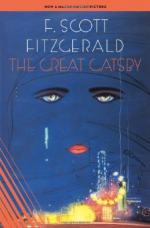|
This section contains 6,119 words (approx. 21 pages at 300 words per page) |

|
SOURCE: Kehl, D. G., and Allene Cooper. “Sangria in the Sangreal: The Great Gatsby as Grail Quest.” Rocky Mountain Review of Language and Literature 47, no. 4 (1993): 203-17.
In the following essay, Kehl and Cooper explore F. Scott Fitzgerald's fascination with Arthurian myths, focusing on his use of the Grail legend in The Great Gatsby in particular.
Near the end of Fitzgerald's This Side of Paradise, Amory Blaine, returning to Princeton after his disillusioning sojourn in Atlantic City, concludes that he knows one thing: “If living isn't a seeking for the grail it may be a damned amusing game” (278). For Fitzgerald, by the time he wrote The Great Gatsby five years later, living had become both a quest for the grail and “a damned amusing game,” with emphasis sometimes on the quest and sometimes on the game. It took Fitzgerald another eleven years and a “crack-up” to verbalize the paradox...
|
This section contains 6,119 words (approx. 21 pages at 300 words per page) |

|


